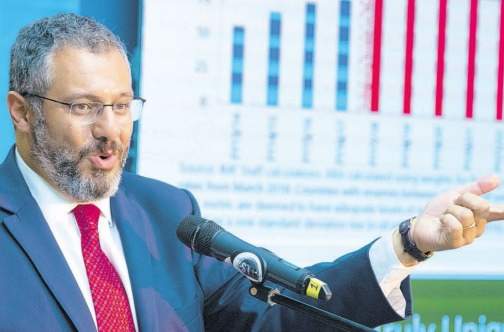Dr Karim Youssef, International Monetary Fund (IMF) resident representative to Jamaica recently in commending Jamaica’s step towards financial inclusion for small and medium sized enterprises (SMEs), has said that if the project achieved 50 per cent of its goals – it could be history making.
Speaking at a Private Sector Organisation of Jamaica (PSOJ) access to finance panel (ATFP) on Friday last, Youssef shared these thoughts also lauding the programme as a powerful and effective public-private partnership, with a real chance of succeeding given the high level of involemnet from key stakeholders.
“If the project achieved 50 per cent of its goals, economic history books would be written about the Jamaican miracle,” he said.
A release last week informed that he also pointed out that digital banking service in a digital financial ecosystem is imperative, also mentioning the significance of a reverse factoring platform. He noted credit registries; know your customer (KYC) databases, land titling solutions, collateral registry and training and financial literacy as some key elements to the successful implementation of a new SME ecosystem.
In quoting statistics from the November 2019 IMF country report, he highlighted that “the “2017 IFC Enterprise Finance Gap database suggests that unmet demand for credit by both formal and informal SMEs is around 20 per cent of GDP. Financing constraints faced by Jamaican SMEs are around 18ppts higher than the Caribbean average.”
In addition, “staff calculations suggest that closing the SME financing gap identified by the IFC could raise medium-term growth by 0.5 per cent,” the report further stated.
Jamaica Banker’s Association President, Jerome Smalling, also gave his endorsement of the initiative.
“Moving the needle as it relates to SMEs access to finance will significantly benefit Jamaica’s economic future,” he said.
In acknowledging the challenges, Programme Architect and Director, Nevada Powe, used the metaphor of a pipe that was clogged in multiple areas. According to Powe, this meant that the monies did not flow to SMEs because multiple issues had to be fixed at once: regulation, credit bureau ratings, credit adjudication, products, and SME formalisation and training among other factors.
He pointed out that the PSOJ AFFP has its view on the whole pipe and urged all the stakeholders to keep a view on the whole pipe and not just their area of the clog, opining that as a result of the unclogging, Jamaica will see “the fastest growth we have ever seen in the country’s economic history.” He further outlined some key reasons which will account for the programmes’ likely success, among which are : the alignment of all the major stakeholders at the same time; the fit for purpose programme design which considers the realities of Jamaica and a commitment to push through to last-mile implementation and full embedding.
“The third workshop in the series will be held early 2020 and will focus on key issues affecting microfinance institutions and credit bureaus, including the new regulatory environment,” the release closed in saying.
http://www.jamaicaobserver.com/sunday-finance/imf-representative-predicts-significant-economic-says-history-will-be-created-if-country-achieves-even-half-of-its-goal-to-provide_181076




Leave A Comment